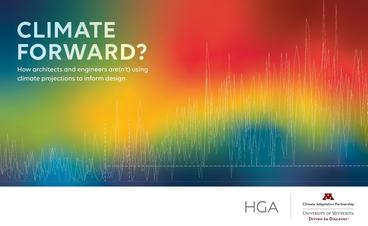
In partnership with HGA, MCAP launched a multi-faceted, comprehensive effort to characterize the climate information needs of architecture and engineering (A&E) professionals, challenges they encounter accessing, understanding, and applying this information, and opportunities to advance climate resiliency actions and services provisioned by the A&E sector.
A&E professionals typically rely on historical weather data as a primary resource for performance analysis and design. These data, based on past median weather conditions and sometimes more than three decades old, has traditionally been considered sufficient for establishing ‘climate normals’, and is reinforced by existing standards, laws, and conventions. However, our changing climate renders these characterizations much less useful, poorly reflecting the range, frequency, and intensity of potential future weather conditions that a building will need to withstand during its lifespan. Put simply—changes in climate that have already occurred and are projected to occur must be accounted for when designing for climate change adaptation and mitigation.
Drawing from an in-depth review of the academic and professional literature related to A&E climate services and data use, distribution of a national online survey of A&E professionals and a series of semi-structured interviews with A&E leaders, the project team created a new report Climate Forward: How Climate Projections Are(n’t) Used to Inform Design which reveals the gap between the current state of A&E practice and climate science.
Climate Forward
Key Findings
The project report details four key findings that demonstrate a gap between the current state of A&E practice and climate science and articulates a key role for boundary organizations and climate data developers for building partnerships and capacities to bridge this gap alongside A&E professionals.
- Sustainable design services are primarily focused on climate change mitigation (reducing carbon emissions) and do not often include designing for climate change resilience (design measures that factor in the projected climate over the lifespan of the building and systems).
- While A&E professionals are aware of and interested in using climate projection data in their work, few firms are regularly using projections to inform design decisions.
- A&E professionals identify a number of barriers to using climate projection data, including a lack of client requests; a lack of standards and codes; resolution needs; format, content, and cost; trust of the data; and a need for internal expertise to use the data.
- There is a strong need for the development and promotion of industry standards, mandates (including building codes), guidance and training for using climate projections in A&E applications.
The research makes a decisive case for the development and promotion of industry standards, mandates (including building codes), guidance and training for using climate projections in A&E applications. It also articulates the critical role for boundary organizations and climate data developers, like MCAP, to build partnerships and capacities to bridge this gap alongside A&E professionals. The report concludes with recommended actions that could close the gap between climate science and the A&E professionals who are designing buildings and infrastructure that will withstand climate change.
About Our Partners
HGA is a national interdisciplinary design firm rooted in architecture and engineering. More than 1000 people in 12 offices from coast to coast work to make a positive, lasting impact for clients in healthcare, arts and culture, community, corporate, education, government, science and technology, and energy markets. HGA has been a leader in an industry-wide conversation around how to better inform projects with climate projection data, using these data for climate adaptive design solutions. Learn more about HGA.
Project Team

Patrick Cipriano
HGA+MCAP Sustainability Intern

Alissa Kingsley
HGA Sustainability Operations Leader

Heidi Roop
MCAP Director
Core work areas
References
Laxo, A., Hoppe, B., Cipriano, P., and Roop, H.A. 2023. Climate Forward: How Climate Projections Are(n’t) Used to Inform Design. A report prepared by HGA and the University of Minnesota Climate Adaptation Partnership.
Rastogi, P., Laxo, A., Cecil, L. D., & Overbey, D. (2022). Projected climate data for building design: barriers to use. Buildings and Cities, 3(1), 111–117. DOI: http://doi.org/10.5334/bc.145


